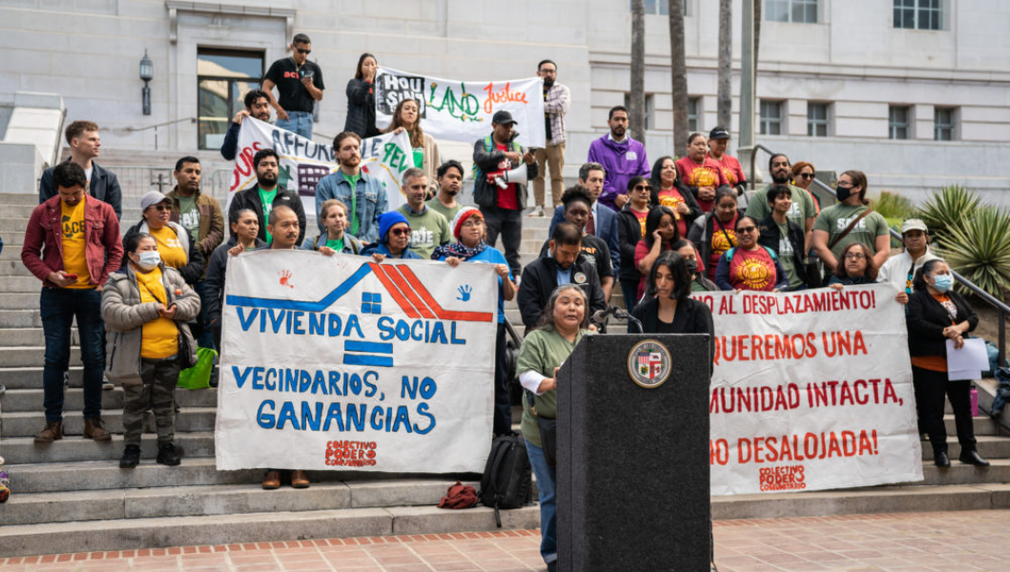Los Angeles Social Housing Toolkit
The Los Angeles Social Housing Toolkit will serve as a foundational community resource that builds the widespread narrative and expertise needed to implement and build social housing. Through customizable modules, people will be given the tools to facilitate their own trainings through popular education and technical presentations and activities.

What is the primary issue area that your application will impact?
Affordable housing and homelessness
In what stage of innovation is this project, program, or initiative?
Pilot or new project, program, or initiative (testing or implementing a new idea)
What is your understanding of the issue that you are seeking to address?
Social housing is well established in various cities around the world but is largely unknown in the United States. Through institutional exclusionary policies and the capitalization of homes for profit, our communities are now faced with housing costs that are not attainable and are facing increasing corporate landlord ownership that makes them susceptible to exploitation and to unachievable rents. ACT-LA identified social housing as a housing model that could meet the needs of low-income communities of color and be a transformative solution to Los Angeles’s housing crisis. ACT-LA was a key player in the writing and winning of Measure ULA in 2022. We had the opportunity to take community input and write into law a funding source to build an alternative permanently affordable model of housing, also known as social housing. Now there is a need to educate Angelenos about this new model coming to Los Angeles, and build the ecosystem that will support long-term success of this model.
Describe the project, program, or initiative this grant will support to address the issue.
The Social Housing Toolkit is designed to consolidate educational curriculum, and to build a robust group of staff and tenant leaders who deeply understand social housing. Beyond a traditional slide deck or informational webinar, we will be providing people with the ability to take concept pages and activities and adjust them according to the elements of social housing that they want to highlight. We will be convening organizational members and allied experts to contribute to the creation of the modules. The modules will cover a range of topics from decommodified housing, campaign development and implementation, community organizing tools, financial and rental breakdowns. Each module will also have attached activities and definitions to give facilitators a guide to reach many audiences. This toolkit will serve as an online resource in various languages that can be easily accessible to housing allies. They will learn about the opportunities social housing will provide to them and their communities, about the history and status of the current campaign, and gain skills to advocate and be able to explain social housing both within their communities and at the Los Angeles city and county levels. This toolkit is meant to be adjusted as needed for intended audiences to build the aforementioned capacities for staff, CBOs, funders, developers, communicators, tenant leaders and other audiences across LA County.
Describe how Los Angeles County will be different if your work is successful.
The Social Housing Toolkit will build the leadership and capacity of our coalition members to orient their staff and community membership base and create internal expertise throughout LA County. This toolkit will be accessible and modifiable for housing allies across the region and nation that are interested in building up the capacity to advocate for and build social housing in their regions. During the grant period, we will successfully complete our toolkit in various languages and launch its publication. LA is currently the only city in the country with a large-scale, permanent funding source to fund this type of housing; in this next fiscal year we expect over $60 million for this program. With the support of a toolkit and active organizing efforts, communities will be well oriented to the new permanently affordable alternative models of housing being implemented throughout the city. This will also prepare LA County that may soon get their own social housing funding source.
What evidence do you have that this project, program, or initiative is or will be successful, and how will you define and measure success?
In the past two years, we have created a social housing organizing group and have a social housing leadership cohort of tenant members throughout Los Angeles. Our coalition also holds quarterly social housing campaign meetings for our membership and allies and bimonthly, internal committee meetings for coalition members. With this experience, we have gained valuable input from housing field experts and advocates and tenants about various topics to cover to ensure understanding and commitment to the social housing vision. Using our already existing social housing organizing structures and partnerships with cross sectoral coalitions, we will leverage the expertise of our members and incorporate continual feedback in this toolkit. Since it will be an online resource, we will be able to see the engagement with the toolkit and internally we can mobilize organizing and outreach strategies as needed.
Approximately how many people will be impacted by this project, program, or initiative?
Direct Impact: 500.0
Indirect Impact: 12,000.0